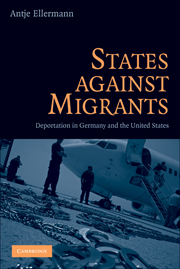Book contents
- Frontmatter
- Dedication
- Contents
- List of Figures
- Acknowledgments
- Introduction: Deportation and the State
- 1 A Theory of Socially Coercive State Capacity
- 2 The Legislative Politics of Migration Control
- 3 Deportation and the Executive Politics of Implementation
- 4 Deportation and the Street-Level Politics of Implementation
- 5 Conclusion
- Appendices
- References
- Index
5 - Conclusion
Published online by Cambridge University Press: 05 July 2015
- Frontmatter
- Dedication
- Contents
- List of Figures
- Acknowledgments
- Introduction: Deportation and the State
- 1 A Theory of Socially Coercive State Capacity
- 2 The Legislative Politics of Migration Control
- 3 Deportation and the Executive Politics of Implementation
- 4 Deportation and the Street-Level Politics of Implementation
- 5 Conclusion
- Appendices
- References
- Index
Summary
There is evidence that ordinary Americans want to change current policies, lots of evidence that judges and prosecutors at local and state levels are responding. … Legislators and executive branch officials in the federal government and in the large, heavily populated states, however, are neither repealing nor fundamentally recasting failed policies.
(Tonry, 2004, p. 4)In the preceding chapters, we have traced the politics of deportation as it evolves over the various stages of the policy process. This final chapter will serve two distinct purposes. First, we will return to the most significant findings of this book. I will begin by summarizing the principal claims of the theory of coercive regulatory capacity developed and tested against the case of deportation. The chapter will then identify some key contributions of this research to the study of migration control: what has this analysis told us about the capacity of liberal states to control unwanted immigration?
The second purpose of this chapter is to apply the argument to two sets of larger questions. The first set of questions extends the argument across policy fields and considers how the findings of this book might be generalizable beyond the case of deportation. The second set of questions extends the argument over time. Have the immigration reforms that were passed in the aftermath of September 11, 2001, succeeded in strengthening the deportation capacity of immigration bureaucrats? And, given the pervasiveness of policy failure in this field, has there been correction by means of negative feedback effects in either of the two countries? In other words, has implementation failure served as a policy lesson for subsequent rounds of legislative reform?
THEORIZING SOCIALLY COERCIVE STATE CAPACITY
The theoretical framework presented and tested in Chapters 1 through 4 specified the basic dynamics that drive policy-making and implementation in the sphere of coercive social regulation. Let us reiterate what I have argued are the key components of a theory of coercive regulatory state capacity – components that significantly distinguish this policy field from that of economic regulation, and from the politics of distribution and redistribution.
- Type
- Chapter
- Information
- States Against MigrantsDeportation in Germany and the United States, pp. 147 - 172Publisher: Cambridge University PressPrint publication year: 2009



